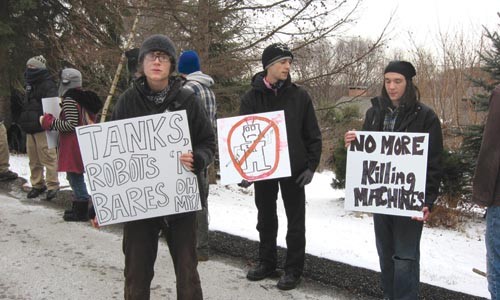Despite cold temperatures and a long walk to get there, on Jan. 26, members of the Pittsburgh Organizing Group protested outside the Wexford home of National Robotics Engineering Center director John Bares.
While the setting may have been different, the message was the same: to stop what POG calls "war profiteering and warfare development" at Carnegie Mellon University.
Fifteen demonstrators met at the Pine Creek Shopping Center, a suburban strip mall almost two miles from Bares' home, prepared to complete the trip on foot. POG member Alex Bradley said that they wanted to challenge the way people think of the antiwar movement by removing it from its familiar city backdrop.
Caroline Savery, a Mount Washington resident, said that she had to catch the incline at 11:10 a.m., to make it in time for the bus from Downtown. Shortly after 1:30 p.m., the walk to Bares' home commenced. It was mostly uphill and the temperature hung below freezing.
Aside from answering the occasional question from an officer in a trailing McCandless Police SUV, the group rarely interacted with the police, a noteworthy dissimilarity from its in-city protests that have sometimes been attended by numerous police, some wearing riot gear.
In fact, at Mayor Luke Ravenstahl's December inauguration, about 90 police officers were dispatched to watch fewer than 15 protesters.
"[Suburban police are] definitely less used to this," Savery said, "but they won't come in with the same preconceptions."
According to a POG statement, the group decided to protest at Bares' home in reaction to a recent $14 million NREC contract to continue developing "Crusher," described as "a new generation of unmanned offensive ground weapons for the U.S. Army." In April 2006, CMU announced the unveiling of the 6.5-ton Crusher in a press release, heralding it as "a unique ground vehicle that offers new strength, mobility and autonomy features for the army's effort to keep its troops out of harm's way."
As POG members walked across the parking lot on its way to Bares' home on Saturday, a yellow convertible sped by and a man from within shouted, "War rules, go Bush." Leaving the parking lot, the group marched in a loosely held single-file line, necessitated by the lack of a sidewalk.
After a circuitous route that led around a bend and into the trees, the group reached Bares' home. Across the street, a neighbor was flying the Confederate and American flags on the same pole. The street was empty except for the officer in the SUV, who at times videotaped the protest.
Not all of the marchers were strangers to Wexford. One man (who refused to be identified but said he lives nearby) testified that the Confederate flag was "not particularly" representative of the area.
To keep warm during the protest, which lasted an hour, the protesters sang, danced and played games in the street. They smoked, talked and traced patterns in the snow. During the picketing, a single car drove by; it was an unmarked police car. No neighbors came out.
If Bares was home during the protest, he made no effort to make himself known. Likewise, no one answered the house's phone after the protesters started back down the hill. Savery said that she and another POG member dropped off a pamphlet about the protest more than a week ago with a woman in the house.
Bares has not responded to calls from City Paper to his home and office. On Monday morning, an NREC administrator who refused to identify herself said that Bares was in a "very important meeting" all day.
According to the statement from POG, Saturday's trip to Wexford served a dual purpose: protesting Bares' home while asserting the right to picket in front of a private residence. The statement made reference to a non-POG protest last year in which animal-rights activists protested at the church of Allegheny County Chief Executive Dan Onorato. After that protest, according to the statement, "some government appointed officials called for an end to the right of protesters to hold events at locations such as private homes and places of worship."
Such bans are not without national precedent: A Texas city near Houston recently banned picketing in front of homes following a December protest at the home of a man who shot and killed two men who were burglarizing his neighbor's house. A U.S. Supreme Court ruling from 1988 upheld that such ordinances are not inherently violations of freedom of speech, provided they are narrowly tailored and leave open other channels of protest, such as general marching through residential neighborhoods.
Sara Rose, a staff attorney in the Pittsburgh office of the American Civil Liberties Union, said in a Friday interview that she was unaware of any local municipalities having enacted such a ban.
During the walk back to the cars, Bradley seemed realistically optimistic. "It went kind of like we expected," he said. "It went as good as you can expect on a freezing-cold day, miles from anywhere."















